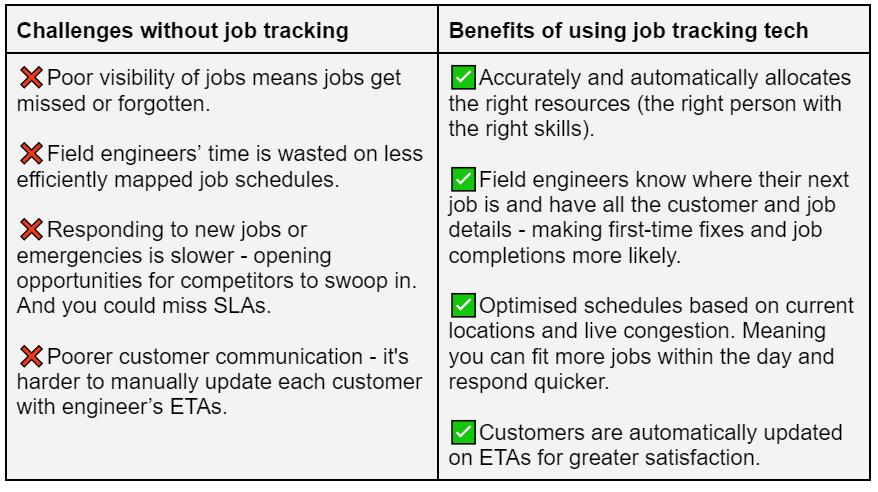Let’s face it, your field engineers are crucial to generating revenue. The more efficient they are, the more invoices are put through. But they have a lot to juggle to simply get jobs over the line; jumping from job to job, fault fixing, traffic navigating, and paperwork completing.
So, the question is: are they working as efficiently as possible? And do they even have all the tools they need to get jobs completed quickly while keeping service levels high? If the answer is no, you are not alone.
This is where job tracking tools make all the difference. In fact, field service businesses have seen an 80% increase in efficiency when using them. Without job tracking tools, you can be stuck with engineers wasting time piecing together job details, time lost travelling from A to B or waiting for equipment. Or, even work orders being misplaced and angry customers.
In this blog, we’ll delve into how exactly job tracking increases efficiency.👇
WHAT ACTUALLY IS JOB TRACKING?

Job tracking may sound like a mundane term, but it’s essential in field service management. You’ll be doing it in some fashion – whether that’s through whiteboards, or spreadsheets, etc. But the most efficient way is with field services tech. You can think of it as a GPS – not just for locations – but for tasks, progress, and performance:
☑️Want to know the exact location of your field engineers in real-time? It’s got you covered.
☑️Need to monitor the progress of critical projects? Consider it done.
☑️Struggling with inefficient routing that slows down your team? Gone.
Job tracking tools mean real-time scheduling and tracking, automated notifications, and automation of job allocation for the highest priority jobs *based on rules you’ve set*.
Ultimately, tracking the entire workflow, and in real-time, allows for optimal planning of every area of job management.
BREAKING DOWN THE 80%
First up, let’s cover just a handful of the challenges and benefits *with and without* job tracking technology so you can see how it powers these efficiencies.

As you can start to see, job tracking is more than just “knowing where your staff are”. It’s about creating a well-oiled scheduling machine to decrease admin overheads, gain cost savings, and improve customer satisfaction.
3 TOP USE CASES OF JOB TRACKING TECHNOLOGY

So, how exactly does job tracking increase efficiency? There are certain functions that allow field service businesses to optimise operations.
- #1: Automated dispatching: Admin time is slashed with the ability to allocate jobs based on real-time engineer availability, skill set, and proximity to a job. Less time spent assigning jobs, and optimising routes, means more jobs completed.
- #2: Real-time reporting: A dashboard tracking performance metrics in real-time provides a 360 degree and instant view of live workload distribution, project status, revenue and more. It allows businesses to see where resources are under-used and who needs additional support.
- #3: Integrations with other tech: Integrating with payroll, CRM, inventory systems and more, no time is wasted re-entering data and everyone can see the data they need in one place.
In summary, first, automated dispatching streamlines admin tasks, letting your team focus on getting the job done efficiently. Next, real-time reporting highlights what’s working and what needs improvement, instantly. Lastly, tech integrations knit various parts of the business together. With such capabilities, it’s clear that job tracking tech not only saves time but creates a more streamlined, data-driven operation.
HOW JOB TRACKING TECH WORKS IN PARTNERSHIP WITH SERVICE MANAGEMENT
Successful field service management businesses balance delivering services quickly, but also to satisfactory levels for customers. The pay-off here is those who do this well see word-of-mouth promotion and greater inbounds.
However, this is when growth challenges hit. As more and more jobs are added to the process, it gets trickier to manage if you don’t have the right systems in place. This is where automation becomes essential to keeping things running smoothly.
📢Cue job tracking tech.
To put this into perspective, let’s look at a real-life case study: Future Group.
CASE STUDY SPOTLIGHT: HOW FUTURE GROUP USES JOB TRACKING TO INCREASE EFFICIENCY BY 80%

Electrical and HVAC company Future Group managed hundreds of field jobs daily. But with paper-based tracking, there was limited visibility into engineer availability and job status. Essentially, office staff wasted hundreds of hours on manual scheduling.
After implementing an automated job tracking system, Future Group benefited from:
✅80% boost in efficiency.
✅Real-time oversight of all operations.
✅Intelligent dispatching increased productivity by 15%.
✅Mobile access to full job details improved field service delivery.
✅Macro-level reporting enabled better workload balancing and strategic planning.
“With the system, we have real-time visibility and everything can be done much more quickly and efficiently. Invoices are raised within 24 hours and customers are kept up to date on the status of work – they are all very impressed with the reliability and professionalism of the service we provide” – Meir Halter, Director, RMS.
📘You can read the full case study here.
But Future Group isn’t alone.
Just look at how these other field service businesses – from a range of industries – improved growth with job tracking tech:
- DFP Services boosts annual growth by 30% (read more here)
- NM Services reduces office and accounts admin by 50% (read more here)
- RMS sees fourfold business expansion (read more here)
- Target sees $3.5 million turnover per year (read more here)
These are clear examples that job tracking technology provides measurable gains across various sectors. And it proves that this isn’t a one-off success but a sustainable strategy for excellence in field service management.
MOVING TO ACCELERATED GROWTH WITH JOB TRACKING TECHNOLOGY
To sum up, the benefits of job tracking are clear. Ultimately, without comprehensive job tracking – powered by the automation and optimisation that tech provides – field service businesses would struggle to manage a growing business.
With it, you can track performance and productivity in real-time, automatically keep customers updated, and make adjustments to operations. Engineers know what their next task is and have all the information at their fingertips. Workloads are balanced and travel is minimized. Jobs are completed right the first time. And it’s how businesses like Future Group see 80% increases in efficiency.
